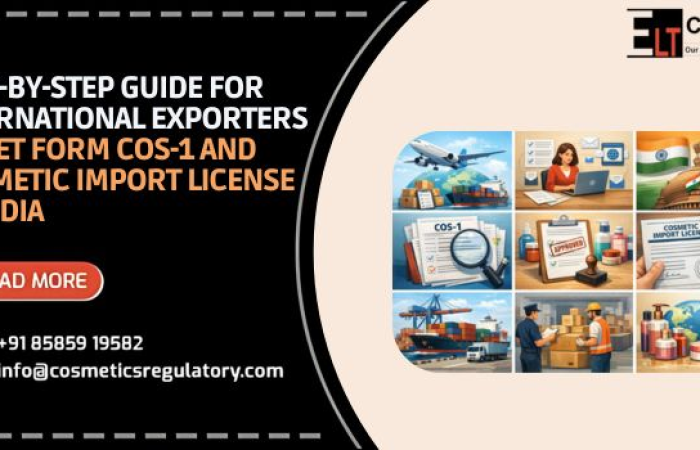Step-by-Step Guide for International Exporters to Get Form COS-1 and Cosmetic Import License in India

Great things in business are never done one. They're done by a team of people.
End to End Regulatory Support in
In India’s competitive market for baby care, cosmetic registration for childcare products is a must to sell these products lawfully. As awareness about product safety rises, compliance with CDSCO is no longer an option but an obligation. Be it a manufacturer, importer, or distributor, it is important to know the cosmetic registration process.
This detailed guide will walk you through the regulatory process and application procedure for a cosmetic registration certificate for child care products. It will ensure that your business complies with Indian regulatory requirements.
Child care cosmetics are care products that are manufactured especially for infants, babies, and toddlers. Child care cosmetics are manufactured to be soft and harmless for babies’ sensitive skin. In comparison with regular cosmetics, baby care products have stricter standards for the reason that many different factors are responsible for this difference. That also involves ensuring the baby products do not irritate and lead to an allergy, and being cautious about causing no harm in the long run.
As per the list of cosmetics under the Drugs and Cosmetics Act, 1940, CDSCO classifies various types of baby lotions that must be registered. Such as:
Non-medicated wipes: for hygienic reasons and cleaning.
If you plan to market baby care cosmetic products in India, particularly if imported from abroad, then they need to be registered under the Central Drugs Standard Control Organization (CDSCO). It is done so that the cosmetic products are safe for babies and meet Indian cosmetic standards.
The following is a step-by-step, simplified explanation of how the process of registration process is carried out:
Determine Your Product Type : First, determine whether your product is a drug or a cosmetic. If the product cures or heals an illness, it may be a drug. If it's simple baby care like lotion, oil, shampoo, or powder, it will most likely be a cosmetic.
Appoint an Indian Agent : If your business is located outside India, you need to appoint a local representative, also referred to as an Indian Authorized Agent. They will do the paperwork and communicate with CDSCO on your behalf.
Collect All the Documents Required : For cosmetic registration for childcare products with Central Drugs Standard Control Organization (CDSCO) of India, you require a list of documents. These documents are intended to assist CDSCO in checking whether the product is safe, authentic, and per Indian regulations.
Register on the SUGAM Portal : You have to register on the SUGAM portal, which is the official online platform of CDSCO. After you register for an account, you can complete the online application form and upload your documents.
Pay Government Fees :
CDSCO takes a registration fee. The minimum fee is:
1. USD 250 per product category
2. USD 1,000 for every variant (such as various scents or colors)
Submit the Application : Submit your complete application via the SUGAM portal. Ensure that all the details are accurate and consistent across all your documents.
CDSCO Review : CDSCO will review your application before granting approval of cosmetic registration for childcare products. They will look through your documents, ensure the ingredients are safe, and ensure labels comply with Indian regulations. They may request additional information if you've left something out.
Obtain Your Registration Certificate : If all is well, CDSCO will sanction your application and give you a Registration Certificate (Form COS-2). Your certificate is three years from the date of issue and permits you to sell and import your product in India.
Begin Selling in India : You can now bring your baby care cosmetics into India and sell them legally since you are registered. Just ensure your packing and labels remain the same as approved.
Stay Compliant After Approval : After your product is released into the market, you still have to continue complying. Keep saving records, address customer grievances appropriately, and renew the registration before it runs out.
To get cosmetic registration for childcare products with the CDSCO in India, a detailed set of documents needs to be filed. Below is a list of documents that are required:
Covering Letter
Form COS-1 (previously Form 42)
Product Information File (PIF)
Free Sale Certificate (FSC)
Ingredient List with Composition
Label Artwork and Packaging Information
Safety and Stability Data
Manufacturing License
Plant Master File (PMF)
Non-Animal Testing Declaration
Clinical Safety Data (if applicable)
Certificate of Analysis (CoA)
The Central Drugs Standard Control Organisation and the Drugs and Cosmetics Rules, 1945, prescribe certain labeling requirements. Every cosmetic product must comply with these requirements before applying for cosmetic registration for childcare products.
Here’s a list of key details that a childcare cosmetic product label requires in India:
Though the registration process is the same, child cosmetics face stricter scrutiny due to higher risks of allergies, toxicity, and irritation. The formulation of certain products, such as baby powders, may also demand additional toxicology data and safety data.
India currently has no separate classification for child cosmetics, although regulators often expect:
Compliance safeguards infants by making products safe, gentle, and free from dangerous ingredients. It ensures that child care products are subjected to strict quality and safety tests. Regulatory checking avoids allergic reactions, toxicity, or skin irritation among infants. Non-conformity can lead to legal action, product recall, or market withdrawal. It provides a guarantee to parents who expect safe, certified products for kids. Compliance isn’t a choice in the marketplace today, it’s for brand equity and long-term success.
It may be challenging to navigate the regulatory environment for baby care cosmetic products in India, particularly for foreign brands that are not aware of CDSCO guidelines, SUGAM portal procedures, and local compliance requirements. That is where ELT Corporate steps in.
At ELT Corporate, we offer end-to-end regulatory services for cosmetics, sensitive categories such as infant and child care products.
Yes, if the product is imported. CDSCO registration is required before marketing any imported cosmetics in India.
Typically, 3–6 months, depending on document readiness and the CDSCO’s review process.
No, animal testing is banned in many jurisdictions, including the EU and India. Alternatives such as in vitro testing, are used.
It depends on the regulations of the importing country. Most countries require notification or approval before allowing imports.










Adding {{itemName}} to cart
Added {{itemName}} to cart